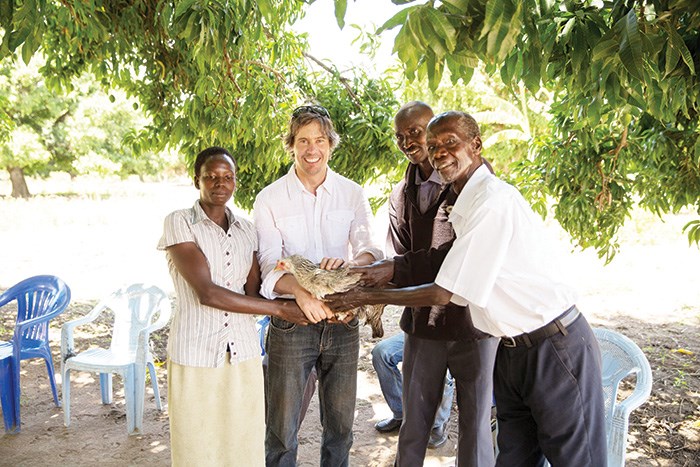Drinking a glass of water in Squamish is as effortless as turning on the tap. However, for many communities in Uganda, and all over the world, accessing clean drinking water is anything but.
While some communities have clean water from a natural spring, by the time cattle have trodden through it, it’s as murky as a muddy puddle – and a lot more contaminated. Others struggle with huge water shortages during the dry season.
Paula Owen, local photographer and co-founder of non-profit GARD (Grassroots Assistance in Rural Development), experienced this firsthand in 1999 while teaching English in a Ugandan primary school.
The organization she’d volunteered through also built water projects and, after seeing the needs of the Ugandan people, when she returned home she felt inspired to do more.
What she didn’t know at the time was that her husband-to-be Geoff Owen, whom she hadn’t yet met, was considering volunteering with a water project too. When mutual friends brought them together, it was a life-changing introduction.
Geoff initially visited Uganda in 2002 to work with an organization setting up bio-sand filters, explained Paula, and added that bio-sand filters are a simple type of water purification system that uses sand, gravel, gravity and some simple engineering to purify the water.
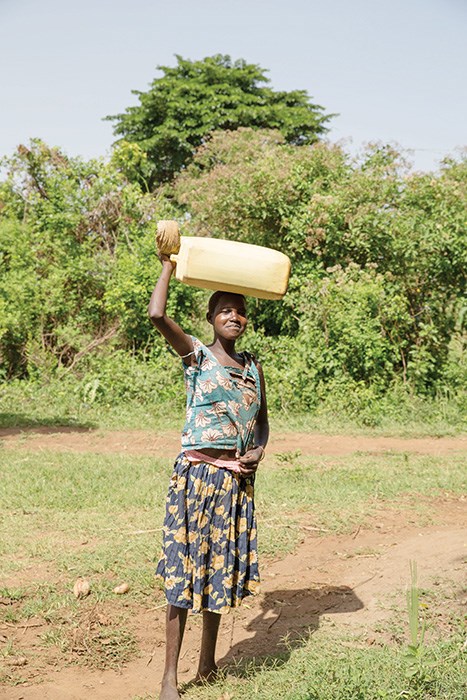
“To run it properly, the water must have a turbidity of over 100,” she said. “Which means it has to be milky-ish, but not so dirty that you can’t see through it. Unfortunately, In the area where Geoff was working the water was filthy, so it wasn’t a very good project for that area.”
This was just one unfortunate example, explained Paula, of so many organizations that go out to Uganda with the best intentions, along with pre-conceived ideas of what the community needs, only to find that the two don’t match.
“Everyone starts with their heart in a really good place and you have all this money from donors and expectations on how you’re meant to spend it, but when you get there it’s maybe not the right technology for the area,” she said.
Geoff could see the people weren’t happy, she said. “So, he asked them, ‘What do you really need?’”
It was a question, it seemed, that few NGOs at the time were asking.
What they needed, explained Paula, was the ability to harvest the rainwater.
“Though it rains an incredible amount during the wet season… it was pretty much going into the ground and they were suffering during the dry season.”
So, Geoff, a geologist at the time, sat down with them and designed a large-scale catchment to hold almost a million litres of water.
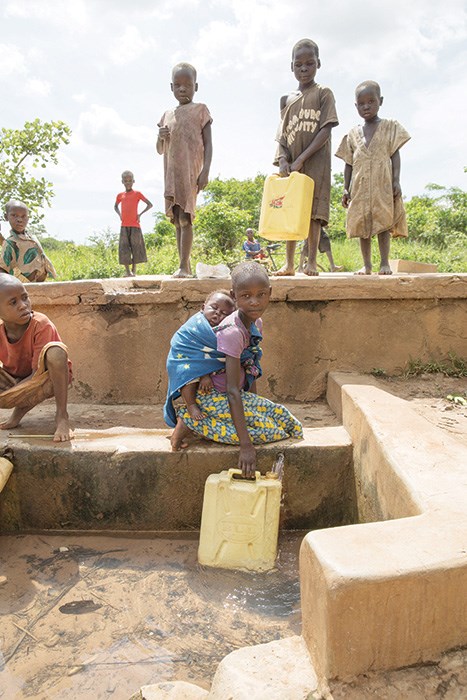
He came home to raise money for the project and returned to Uganda to build it in 2003. In 2005, a group of Geoff’s friends and family, including Paula, visited the village of Kitezo to build another huge water catchment system.
“We had many hundreds of volunteers from the community helping build it,” said Paula. “Women with babies on their backs would help move the dirt while others would hoe… The whole thing had to be dug by hand. It took us six months. CNN even came out to film it because it was an incredible sight to see the whole community get together like that.”
Then came the light-bulb moment for Geoff, Paula and the team.
“We were sitting there in Uganda and said, ‘This is ridiculous. We raised all the money to get here; we’ve done all the planning and are doing all the work. So why don’t we start our own NGO?’”
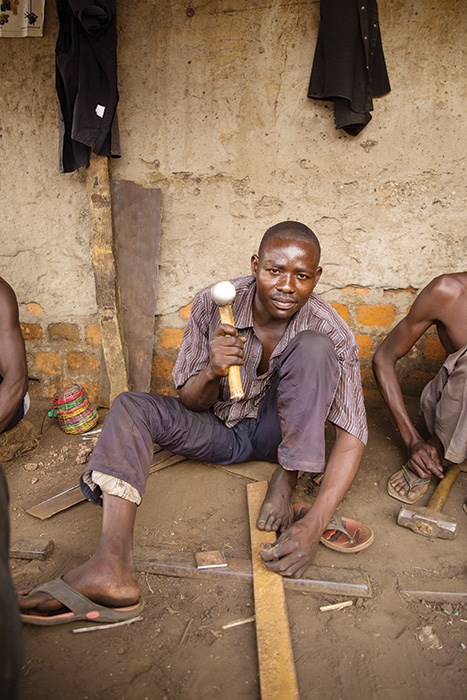
It took three years to process all the paperwork needed to form their own non-profit but, by 2008, they were ready for their first project. One that would take them to Northern Uganda – a place, at the time, few people visited because of fears for personal safety.
“For the longest time, no one went to the northern part of Uganda, even the NGOs, because it was very, very dangerous,” she said. “Sadly, it was to the detriment of the people there, who are still quite behind on most things.”
A Ugandan friend, Peter, took them to a community in Adakingo where unprotected springs of clear water were flowing right into the ground, forming pools for cattle to walk through. Women and children would then collect water from these pools along with any contaminants within it.
“What was coming out of the earth is perfect, but what they were collecting was dirty.”
While Geoff worked with the community to help protect their springs, Paula taught health, sanitation and first aid to small groups of locals.
It’s a partnership of skills that works well and one that’s grown into more than just them. There are now eight board members, including two Ugandans, Bonnie and James, who are employed by GARD to source and build new projects on their behalf.
What makes GARD different from so many other water-project-based charities, is their integrity, explained Paula, who’s witnessed many failed water projects built by third-party organizations.
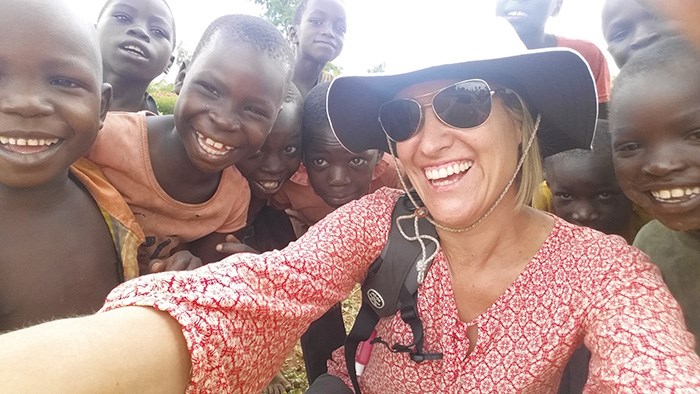
“We’ve had to walk away sometimes,” she said, of the occasions when the technology and community needs don’t match. “It’s preferable to leaving them with something they don’t need.”
What also makes GARD’s projects successful, she said, is the community involvement. By encouraging everyone to help build and maintain their water source, they’re creating ownership and accountability among the village.
Paula and Geoff’s most recent trip to Uganda was one in which they revisited all their previous water projects.
“In one place, villagers had been sweeping around it and had planted grass around it. They were so proud of their water.”
Though having access to clean water changes many things, it’s just the start, explained Paula.
Education is where her passion really lies.
“If you think about our hierarchy of needs we’re only touching the bottom. People are still in survival mode. For example, they have unbelievably fertile land but don’t know how to farm,” she said.
What she’d love to do now is set up a new NGO for school fees and medical supplies.
“Every single time we go, we’re inundated with kids coming and asking us to help them with school fees. It’s around $600 for the year for high school. The average salary is $400 to $500 a year and most people have six kids, so a lot of kids’ education ends around grade five or six.”
Though they’ve helped a few children with their education so far, she’d really like to do more.
“If we were millionaires, it would be perfect,” she said. “I would take somewhere like Adakingo… a community we know, and make it amazing. We could build a model house with solar and teach them how to build a garden and have drip irrigation.”
After seeing all their children go through school and university, they could move onto the next community, she explained.
In the meantime, they’re always looking for additional funds and volunteers, especially anyone with medical training because there’s almost always an accident while on-site (Paula once caught typhoid and almost died, while Geoff once sliced his arm so deeply that he clipped an artery and received five stitches without anaesthetic).
There’s certainly never a dull moment, she said. For more details, visit GARD.ca or contact Paula at info@paulaowen.ca.
